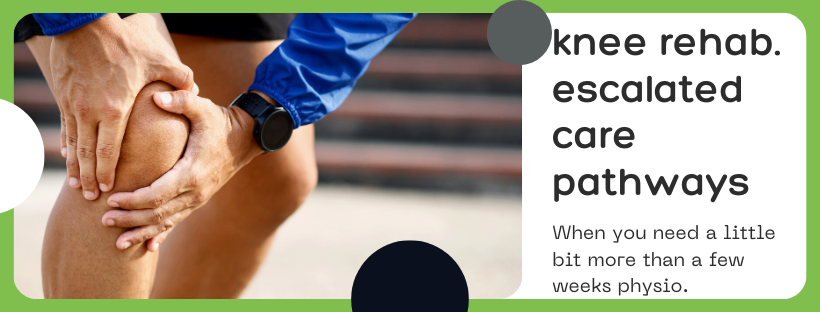
Complex Knee Injuries - A new way forwards with ACC
Over the last few years MyPhysio has been partnered with initially Motus and now RESS to provide a pilot service for ACC, and now an embedded service which is soon to be a more common practice for ACC and will be called Integrated Care Pathways. This will not be just for knees but we have been working on the knee contract.
Knee injuries and conditions are prevalent and can significantly impact an individual's mobility, independence, and overall quality of life. By delving into the intricacies of the RESS model, this blog aims to shed light on a highly effective and patient-centered approach to knee rehab, rooted in the ACC's funded Integrated Care Pathway model.
Initial Assessment. The importance of a thorough initial assessment in knee rehabilitation cannot be overstated. Our physios meticulously gather comprehensive information about the patient's knee injury or condition, medical history, lifestyle, and overall health status. By doing so, they can gain a deeper understanding of the patient's specific needs and challenges, enabling them to tailor the rehabilitation process to address individual concerns and optimize outcomes.
This holistic assessment approach takes into account the patient's overall health and lifestyle factors that may influence recovery, such as age, fitness level, previous injuries, and personal goals. Understanding these factors helps in setting realistic expectations and crafting a customized treatment plan that considers the patient's limitations and potential.
This assessment also serves as a benchmark to measure progress throughout the rehabilitation journey. By establishing baseline data, physios can track improvements in range of motion, strength, pain levels, and functional abilities over time. Regular reassessment during the course of rehab ensures that the treatment plan remains relevant and can be adjusted as needed, maximizing the chances of successful recovery.
Core Principles. Collaboration is at the core of the pathway. This team-based method brings together healthcare professionals from diverse disciplines, each contributing their expertise to create a comprehensive and holistic treatment strategy that addresses all aspects of the patient's condition. The team consists of Orthopedic specialists, Physiotherapists, Pain management specialists, and Nutritionists. The combined expertise allows for a comprehensive evaluation and treatment plan that takes into account the full spectrum of the patient's needs.
The team members regularly communicate and share information about the patient's progress, challenges, and any adjustments needed in the treatment plan. This seamless flow of information ensures that everyone involved is up-to-date and aligned with the patient's evolving needs, promoting consistency and continuity of care.
This collaborative approach empowers the patient to actively participate in their recovery journey. They benefit from the combined knowledge and guidance of the multidisciplinary team, helping them make informed decisions about their treatment options and self-management strategies. Patients feel supported and motivated, knowing that their healthcare providers are working together to achieve the best possible outcomes.
The treatment plans are based on the latest scientific research and clinical guidelines which are predominantly exercise/gym based. Peer-reviewed studies and evidence-based practices are constantly reviewed to ensure that interventions used in the rehabilitation process have a proven track record of efficacy and safety. By adhering to evidence-based practices, the team can optimize the chances of successful patient outcomes. These practices have been rigorously tested and validated, providing confidence that the chosen treatment methods are grounded in scientific knowledge.
The RESS model values the patient's input and actively involves them in the decision-making process. By considering the patient's preferences, values, and priorities, the treatment plan becomes more patient-centered and aligns with their individual goals.
Measuring Success. Throughout the treatment process, the team assesses the patient's progress against their goals and baseline measures using standardized outcome measures. This data-driven approach enables objective evaluation of the treatment's effectiveness and guides any necessary adjustments to the plan.
From a physio perspective this Integrative multidisciplinary approach is benefitting our patients by ensuring seamless integration of evidence-based practices and patient preferences in the planning process for knee rehabilitation. It blends the latest scientific evidence with the patient's values and goals, the treatment plan becomes more patient-centered, effective, and adaptable. This collaborative approach empowers patients to actively participate in their recovery, fosters trust between patients and healthcare providers, and enhances the overall success and satisfaction of knee rehabilitation.
